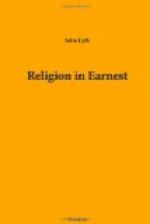she exclaimed, “I wish I was that cat;”
and when asked why, replied, “Because it has
not a soul to save.” The old lady gently
rebuked the foolish thought, and, shewing her its wickedness,
endeavoured to lead her to Him, who said, “Suffer
the little children to come unto me.” Not
long after she began to meet in her father’s
class, and received her first ticket at the hands of
the Rev. Francis Wrigley, at that time Superintendent
of the York circuit. By weekly intercourse with
the people of God, her aspirations after divine sources
of happiness gradually strengthened until she was twelve
years old, when they assumed a more definite form;
although, in consequence of her tender age, her views
of evangelical truth were necessarily crude and defective;
for she still “spake as a child, understood as
a child, reasoned as a child,” It was
during a few days’ visit to her aunt Elizabeth,
who now resided in the suburbs of York, having married
Mr. J. Hawkins of that city shortly after her father’s
death, that she became so unhappy on account of her
sinful and miserable condition, that she could not
refrain from much weeping. The thought of entering
eternity without a change of heart filled her with
alarm. Every looming cloud had a voice which
spoke of the judgment to come; every unpropitious
event awakened painful forebodings. Her fears,
which were the genuine fruits of divine influence,
were further aggravated by the popular excitement
of the times. France was threatening war with
England, and the prevailing apprehensions of the multitude
communicated themselves with double force to the heart
of the sorrowing child. “What,” thought
she, “if they should come now, and I should
be killed in my sins.” Indeed her trouble
increased to such a degree that her aunt was grieved,
imagining that her mother would think she had been
unkindly treated. She therefore resolved to take
her home. On the way a number of circumstances
occurred which to Mary’s childish imagination
were pregnant with evil, and prognosticated nothing
less than the day of general doom. The city was
in a state of unusual commotion, a report had gained
ground that the invader was at hand, some foolish
person had caused the massive portcullis of the city
gate to be let down, several recruiting parties were
parading the streets, two of these she met, and the
shrill blasts of a few mounted trumpeters, together
with a dense and portentous cloud, which just at the
moment spread itself upon the horizon, completed her
dismay. She reached home in tears. Her mother,
whose solicitude was awakened, inquired the cause.
She replied, “Mother, I can’t tell you,
but nothing in this world will make me happy.”
Suspecting the real state of her feelings, her mother
conversed kindly with her, and administered suitable
consolation, but in vain. After committing herself
to God in earnest prayer, she retired to rest with
the conviction, that she was the greatest sinner in
the world; but the next morning, which was the holy
Sabbath, broke upon her with healing in its wings.
She awoke with the words in her mind,




